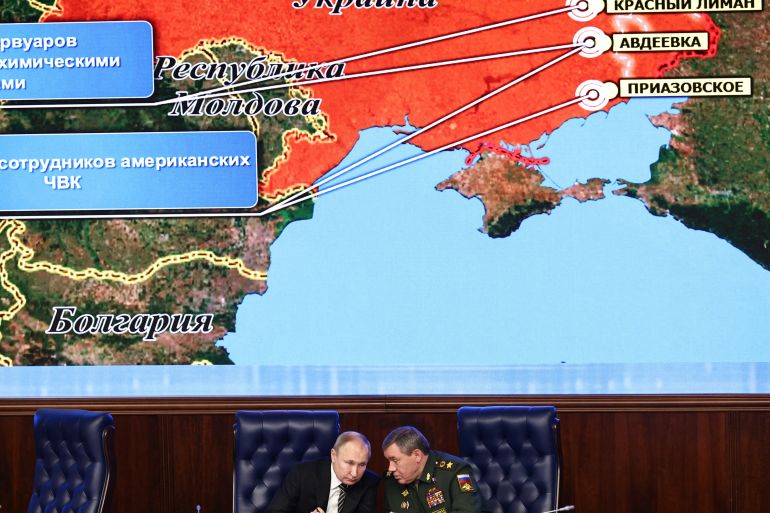Putin blames West for tensions as fears rise over Ukraine
Russian president says he is not seeking ‘bloodshed’ in Ukraine and explains his fears of NATO’s ‘expansion’.

Russian President Vladimir Putin has blamed the West for escalating tensions in Europe, saying it had incorrectly assessed the outcome of the Cold War.
Speaking to senior military officials on Tuesday, Putin said Russia would respond “adequately” to any Western aggression and would develop its army further.
Keep reading
list of 3 itemsRussia expels two German diplomats in tit-for-tat move
Russian with Kremlin ties charged by US with insider trading
“Why did they expand NATO and renounce the missile defence treaties? They are to blame for what is happening now, for the tensions building up in Europe,” Putin said, reiterating his demand for guarantees from the US and its allies that NATO will not expand eastwards.
After what it regarded as its victory in the Cold War, Washington’s judgement has been clouded by euphoria, he said, leading it to poor policy choices.
According to Washington, Russia has amassed tens of thousands of troops on the border with Ukraine.
Moscow has also demanded that NATO refuse to accept the former Soviet republic as a member and guarantee that no weapons or troops will be deployed there.
That demand – contained in a proposed Russia-US security treaty and a security agreement between Moscow and NATO – was drafted amid soaring tensions over the Russian troop build-up that has stoked fears of a possible invasion.
On Tuesday, German Chancellor Olaf Scholz expressed his concern about the build-up in a phone call with Putin, according to a German government spokesperson.
“The German Chancellor expressed his concern about the situation and spoke about the urgent need for de-escalation,” the German spokesperson said in a statement.
Russia has denied it has plans to attack its neighbour but pressed for legal guarantees that would rule out NATO expansion and weapons deployment there.
According to readouts released by the Kremlin, Putin on Tuesday informed French President Emmanuel Macron about Moscow’s “diplomatic efforts on the subject”, and gave Scholz “detailed comments” on the drafts Russia-US security treaty and a security agreement between Russia and NATO submitted last week.
In the conversation with Scholz, “hope was expressed that serious negotiations would be organised on all the issues raised by” Moscow, the readout said.
Putin said during the meeting with senior military officials on Tuesday that he hoped for constructive talks with Washington and Brussels on Russia’s demands.
“Armed conflicts and bloodshed are absolutely not something we would choose, we do not want such a scenario,” Putin said.
“We are extremely concerned that elements of the US global missile defence system are being deployed next to Russia,” he added, specifying that Romania and Poland would soon be capable of launching Tomahawk cruise missiles.
He said Russia’s proposals were no ultimatum, but it had nowhere to retreat over Ukraine.
Speaking at the same meeting, Defence Minister Sergei Shoigu said the United States had deployed about 8,000 troops near Russian borders and, alongside NATO allies, frequently mounted flights by strategic bomber planes close to Russia.
Attempts by NATO to get the Ukrainian army involved in the alliance’s activities present a security threat, Shoigu said.
Diplomatic efforts
Earlier on Tuesday, a senior Russian diplomat said contacts had already begun between Moscow and Washington on the issue of security guarantees that Russia is seeking, and there was a possibility that the sides would reach an understanding.
Assistant Secretary of State for European and Eurasian Affairs Karen Donfried told reporters in a phone briefing that a specific date would be agreed together with Russia to begin talks aimed at reducing the tensions.
Meanwhile, NATO will seek discussions with Moscow early next year to address tensions amid a Russian military build-up on Ukraine’s border, alliance Secretary-General Jens Stoltenberg said on Tuesday.
“We remain ready for meaningful dialogue with Russia and I intend to call a new meeting of the NATO-Russia Council as soon as possible in the new year,” Stoltenberg told a news conference in Brussels.
The NATO-Russia Council (NRC) was created in 2002 to facilitate consultation between the Western military alliance and Moscow, but relations are strained and it last convened in July 2019 despite repeated calls by NATO to revive the format.
Also on Tuesday, however, Ukrainian President Volodymyr Zelenskyy voiced frustration with NATO’s reluctance to speed up Kyiv’s membership in the alliance.
Kyiv has for years been seeking to join the US-led alliance, but Western officials have on numerous occasions said the prospect is not in the cards anytime soon, frustrating Ukraine.